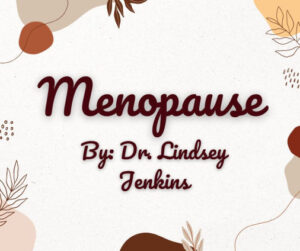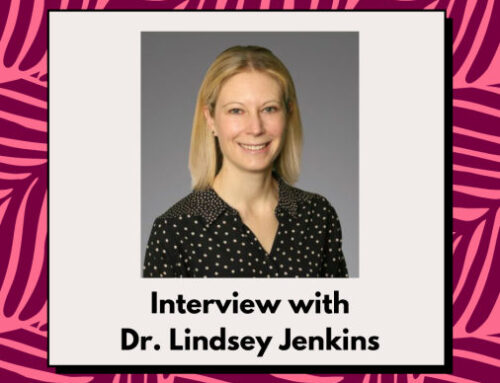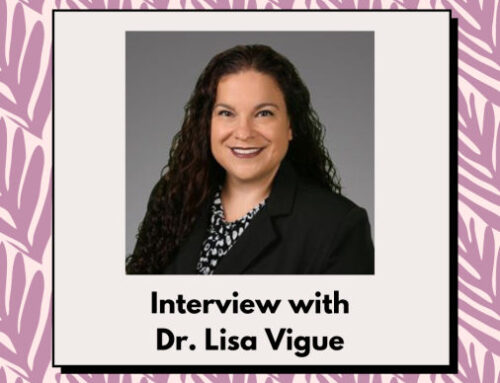 Hello! Dr. Jenkins here to discuss menopause and perimenopause! Menopause is the “pausing” (or more accurately the ceasing) of menstruation. It refers to the time when a woman has her last period. The average age women in the US have their final period is 51. Some women may go through menopause earlier or later. The transitional phase leading to up to menopause is termed “peri”menopause. This phase is an undefined number of years leading up to the final period which for most women will begin sometime in their 40s. Common symptoms of perimenopause include increasingly irregular or heavy periods, hot flashes, night sweats, fatigue, joint pain, “brain fog”, trouble sleeping, weight gain or inability to lose weight, vaginal dryness, and pain with sex. Many women will also report increased mood instability, anxiety, and depression. How each woman experiences perimenopause is highly variable. This can make it difficult for women to know what to expect as they may experience things which are different or more severe than their friends or family members. Women are considered “postmenopausal” after they have gone 1 full year without a period (assuming they are at an age when menopause would be expected). It is important for women who still have their uterus to mark the date when they have gone that full year without a period. This is because if a woman has bleeding after going 1 year without a period, this bleeding is considered abnormal and must be evaluated as it could be a sign of uterine cancer. For women without a uterus there is no need to know exactly when they went through menopause. Checking hormone levels to try and determine if a woman has gone through menopause is not reliable and cannot be used to diagnose menopause. Hormone levels can fluctuate daily and checking 1 level is like taking a picture of your speedometer: You have no idea what happened before or after that picture. If you are experiencing any of the above symptoms or if you have questions about what to expect with perimenopause or menopause, please call and schedule an appointment with one our experts!
Hello! Dr. Jenkins here to discuss menopause and perimenopause! Menopause is the “pausing” (or more accurately the ceasing) of menstruation. It refers to the time when a woman has her last period. The average age women in the US have their final period is 51. Some women may go through menopause earlier or later. The transitional phase leading to up to menopause is termed “peri”menopause. This phase is an undefined number of years leading up to the final period which for most women will begin sometime in their 40s. Common symptoms of perimenopause include increasingly irregular or heavy periods, hot flashes, night sweats, fatigue, joint pain, “brain fog”, trouble sleeping, weight gain or inability to lose weight, vaginal dryness, and pain with sex. Many women will also report increased mood instability, anxiety, and depression. How each woman experiences perimenopause is highly variable. This can make it difficult for women to know what to expect as they may experience things which are different or more severe than their friends or family members. Women are considered “postmenopausal” after they have gone 1 full year without a period (assuming they are at an age when menopause would be expected). It is important for women who still have their uterus to mark the date when they have gone that full year without a period. This is because if a woman has bleeding after going 1 year without a period, this bleeding is considered abnormal and must be evaluated as it could be a sign of uterine cancer. For women without a uterus there is no need to know exactly when they went through menopause. Checking hormone levels to try and determine if a woman has gone through menopause is not reliable and cannot be used to diagnose menopause. Hormone levels can fluctuate daily and checking 1 level is like taking a picture of your speedometer: You have no idea what happened before or after that picture. If you are experiencing any of the above symptoms or if you have questions about what to expect with perimenopause or menopause, please call and schedule an appointment with one our experts!
Now, just because perimenopause and menopause are normal, physiologic life transitions, this does not mean women must suffer through the often-debilitating symptoms! We have many treatments available to help women whose quality of life is suffering. These treatments include life-style changes, over-the-counter supplements, hormonal and non-hormonal medications. Whether or not to start treatment is entirely dependent on the how much a woman feels her symptoms are interfering with the quality of her life. Certain treatments may not be safe depending on your medical history. If you have questions on whether treatment for perimenopausal or postmenopausal symptoms is right for you, please schedule an appointment with our office!
We are accepting new patients! To schedule an appointment with OBGYN Associates, call us at 515-288-3287.
DISCLAIMER: All information on this website is provided for informational purposes only and is not intended to be construed as medical advice. OBGYN Associates shall not be liable for any errors or inaccuracies contained herein, or any actions taken in reliance thereon.

Hello! Dr. Jenkins here to discuss menopause and perimenopause! Menopause is the “pausing” (or more accurately the ceasing) of menstruation. It refers to the time when a woman has her last period. The average age women in the US have their final period is 51. Some women may go through menopause earlier or later. The transitional phase leading to up to menopause is termed “peri”menopause. This phase is an undefined number of years leading up to the final period which for most women will begin sometime in their 40s. Common symptoms of perimenopause include increasingly irregular or heavy periods, hot flashes, night sweats, fatigue, joint pain, “brain fog”, trouble sleeping, weight gain or inability to lose weight, vaginal dryness, and pain with sex. Many women will also report increased mood instability, anxiety, and depression. How each woman experiences perimenopause is highly variable. This can make it difficult for women to know what to expect as they may experience things which are different or more severe than their friends or family members. Women are considered “postmenopausal” after they have gone 1 full year without a period (assuming they are at an age when menopause would be expected). It is important for women who still have their uterus to mark the date when they have gone that full year without a period. This is because if a woman has bleeding after going 1 year without a period, this bleeding is considered abnormal and must be evaluated as it could be a sign of uterine cancer. For women without a uterus there is no need to know exactly when they went through menopause. Checking hormone levels to try and determine if a woman has gone through menopause is not reliable and cannot be used to diagnose menopause. Hormone levels can fluctuate daily and checking 1 level is like taking a picture of your speedometer: You have no idea what happened before or after that picture. If you are experiencing any of the above symptoms or if you have questions about what to expect with perimenopause or menopause, please call and schedule an appointment with one our experts!
Now, just because perimenopause and menopause are normal, physiologic life transitions, this does not mean women must suffer through the often-debilitating symptoms! We have many treatments available to help women whose quality of life is suffering. These treatments include life-style changes, over-the-counter supplements, hormonal and non-hormonal medications. Whether or not to start treatment is entirely dependent on the how much a woman feels her symptoms are interfering with the quality of her life. Certain treatments may not be safe depending on your medical history. If you have questions on whether treatment for perimenopausal or postmenopausal symptoms is right for you, please schedule an appointment with our office!
We are accepting new patients! To schedule an appointment with OBGYN Associates, call us at 515-288-3287.
DISCLAIMER: All information on this website is provided for informational purposes only and is not intended to be construed as medical advice. OBGYN Associates shall not be liable for any errors or inaccuracies contained herein, or any actions taken in reliance thereon.





Leave A Comment